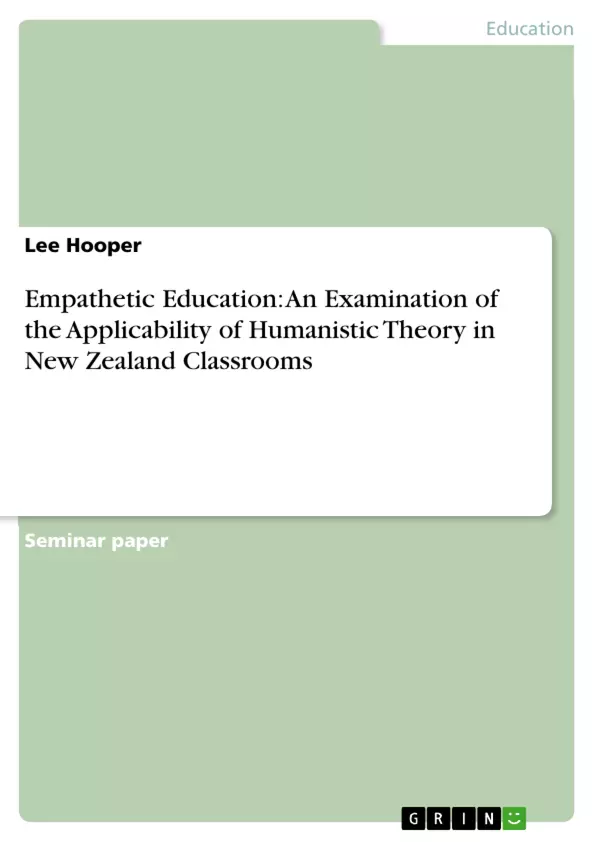Effective learning theories are often a debated area in the educational sector. Humanistic theories offer an approach that both embraces and acknowledges the emotional aspects of the individual learning process. This essay argues that the relevance of humanism towards to the school system is significant, particularly when students begin to show signs of emotional behavioural disorders (EBD). Education from a humanistic perspective looks to implement methods to address the underlying causes that motivate students to act in ways that are both unhelpful to themselves and others in their immediate environment. This can be done through a variety of pedagogical strategies, borrowing on the theories of traditional humanists, such as Carl Rogers and Abraham Maslow, to more modern approaches such as Non-Violent Communication. An outline of some of the pertinent theories and techniques in the humanist approach will be given, alongside their applicability in a New Zealand school context with students who show signs of EBD. Incorporating a culturally-aware approach will also be demonstrated to hold significant value, with relevance to those of both Maori and European heritage. It is concluded that empathetic educational practices provide students and teachers with opportunities to grow and learn together in a symbiotic environment.
Table of Contents
- Introduction to Humanism
- Key theories and concepts
- When an individual's perception of self differs too much from actual experience, psychological imbalances occur.
- The influence of humanistic concepts can also be seen in more modern approaches, with non-violent communication (NVC) incorporating concepts from Maslow, Rogers, and Kohn into its own theory (Rosenberg, 2003a).
- Applicability of the Humanistic approach in an educational context
- Multifaceted student personalities
- Social climate
Objectives and Key Themes
This essay explores the potential of humanistic theory in fostering empathetic education in New Zealand classrooms, particularly for students exhibiting emotional and behavioral difficulties (EBD). It aims to demonstrate the relevance of humanistic approaches, which focus on individual growth and well-being, in addressing the underlying causes of EBD. The essay examines key theories and concepts within humanism, such as Maslow's hierarchy of needs and Rogers' person-centered approach, and explores their applicability in a culturally-aware New Zealand school setting.
- The role of humanistic theory in addressing emotional and behavioral difficulties (EBD) in students
- The importance of empathetic educational practices in creating a supportive and growth-oriented learning environment
- The relevance of key humanistic concepts such as Maslow's hierarchy of needs and Rogers' person-centered approach in education
- The application of non-violent communication (NVC) in promoting empathetic communication and conflict resolution in schools
- The significance of cultural awareness in implementing humanistic educational approaches in a New Zealand context
Chapter Summaries
The essay begins by introducing humanism as a response to the limitations of behaviorism and psychodynamic theory, emphasizing its focus on individual growth and subjective experiences. It then delves into key humanistic theories, including Maslow's hierarchy of needs and Rogers' person-centered approach, which highlight the importance of meeting individual needs and fostering self-actualization.
The essay further examines the concept of incongruence between self and experience, arguing that positive conditional regard can hinder personal growth. In contrast, unconditional regard is presented as a key factor in fostering self-development and congruence. The essay then discusses the influence of humanistic concepts in more modern approaches, particularly non-violent communication (NVC), which emphasizes empathetic communication and conflict resolution.
The final chapter delves into the applicability of humanistic theory in educational settings, outlining key features of a humanistic school culture. These include fostering multifaceted student personalities, creating a supportive social climate, and promoting student intellectual and emotional growth.
Keywords
The key themes and concepts explored in this essay include humanistic theory, empathetic education, emotional and behavioral difficulties (EBD), Maslow's hierarchy of needs, Rogers' person-centered approach, non-violent communication (NVC), culturally-aware education, and student growth and well-being.
Frequently Asked Questions
What is humanistic theory in education?
Humanistic theory focuses on the emotional aspects of learning, individual growth, and the subjective experiences of the student, rather than just academic output.
How does humanism address Emotional Behavioural Disorders (EBD)?
It looks for underlying causes of a student's behavior and uses empathetic pedagogical strategies to help them grow in a supportive environment.
What are the roles of Maslow and Rogers in this approach?
Abraham Maslow’s hierarchy of needs and Carl Rogers’ person-centered approach (unconditional positive regard) are foundational to creating a school culture that fosters self-actualization.
What is Non-Violent Communication (NVC) in schools?
NVC is a modern humanistic approach used to resolve conflicts and promote empathy between students and teachers through clear, compassionate communication.
Why is cultural awareness important in New Zealand classrooms?
A culturally-aware humanistic approach ensures that the values of both Maori and European heritage are respected, creating a more inclusive and effective learning environment.
- Citation du texte
- Lee Hooper (Auteur), 2013, Empathetic Education: An Examination of the Applicability of Humanistic Theory in New Zealand Classrooms, Munich, GRIN Verlag, https://www.grin.com/document/262259



